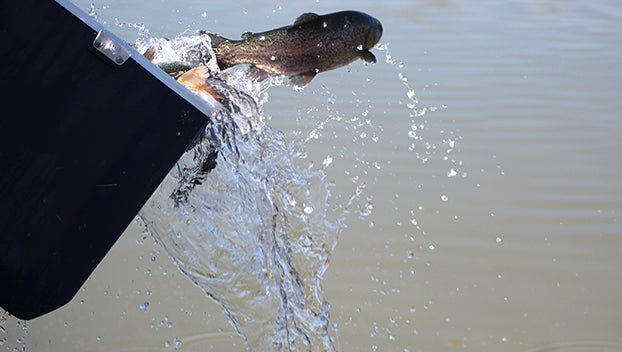New permit process in works for gator hunting
Published 12:05 am Sunday, April 12, 2015

Jay Leggette, left, and Robert Mahaffey pose with a 756 pound alligator they caught during the 2014 alligator hunting season. (Submitted photo)
NATCHEZ — With growth comes change, and that is no different when it comes to alligator hunting.
The Mississippi Department of Wildlife, Fisheries and Parks recently announced there will be a major change in how alligator hunters will receive tags.
“The changes won’t be final until May, but it has been approved by the commission and goes through a 30 day comment period,” Mississippi Wildlife Fisheries and Parks alligator program coordinator Ricky Flynt said.
Previously, hunters received tags based on a lottery. But now, hunters will have to be on their toes if they want to be able to hit the swamps.
“We decided to go on a first-come-first-serve purchase process,” Flynt said. “The customer is required to pay for their permit and the alligator hunting license at the same time. All the permits will go on sale at the same time on July 14.”
Flynt said the decision was in the best interest of the sport.
“The changes came about, first, for the fact that the procedures in place like the drawing and training class were set up early on, when we had a much smaller opportunity as far as permits and interest in alligator hunting,” he said. “The growth and interest in it has outgrown that system, and we are seeing a need to end increased participation among people being picked.”
Each hunter is allowed to buy one permit in one zone according to Flynt.
“There are seven zones in the state,” he said. “There are no changes with the zones and the number of permits remain the same. The process is just changing.”
Flynt said the population of alligators in the state is still healthy, but believes keeping an eye on numbers is important.
“The population is still quite abundant, and I don’t believe the amount of harvesting occurring on a state-wide basis is detrimental,” he said. “Our intent is to keep harvesting conservatively and maintain the population without detriment. The alligator was put on the endangered species list in 1967 due to overharvest, and we certainly don’t want to revisit that.”
With the Mississippi River only a step away, Flynt said Adams County is one of many places alligators inhabit.
“They are certainly there,” he said. “But most people aren’t familiar with navigating those types of waterways. The Mississippi River has a substantial population.”




